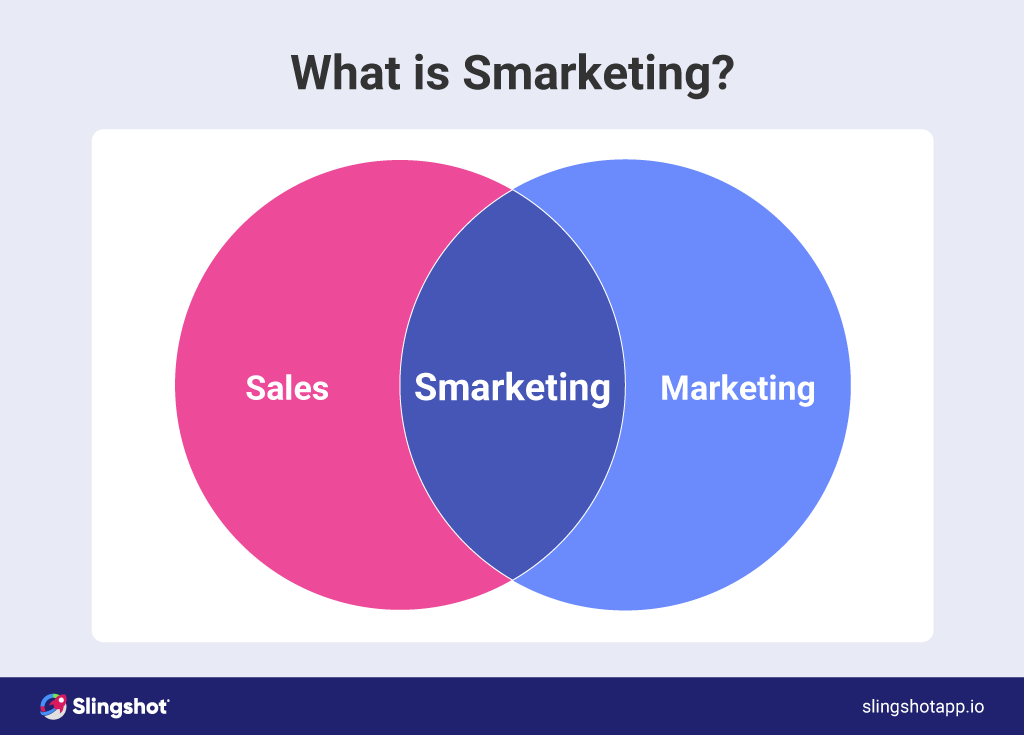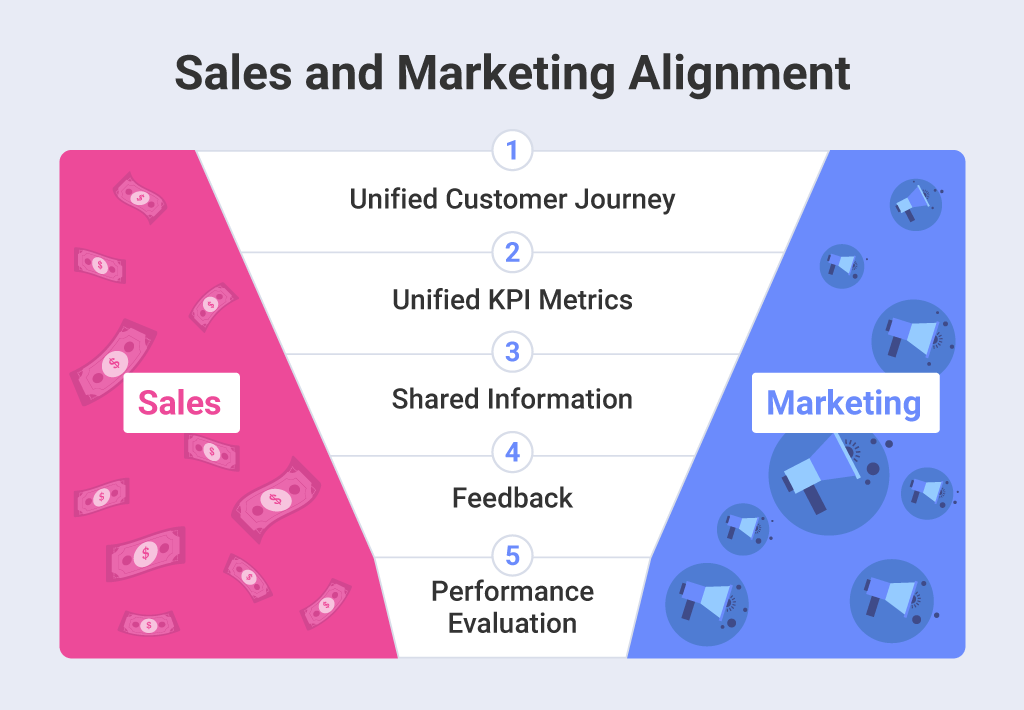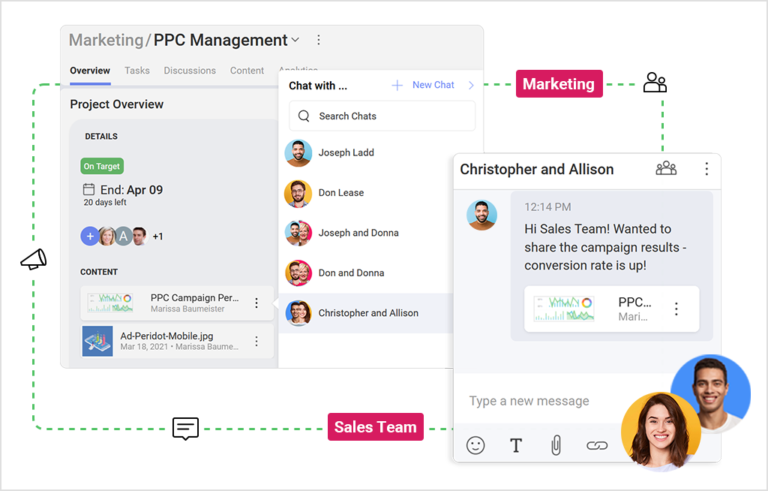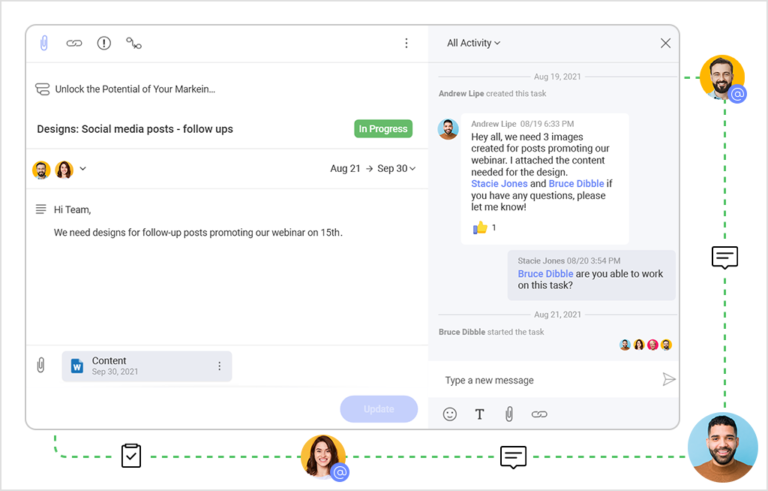

How to Align Sales and Marketing: A Guide to Smarketing
Successful businesses know why it is important to align sales and marketing - and the chaos that can ensue when they are not in sync. So how can you keep improving your business by always keeping the relationship between the two close?
Executive Summary:
Successful businesses know why it is important to align sales and marketing - and the chaos that can ensue when they are not in sync.
So how can you keep improving your business by always keeping the relationship between the two close?
Historically speaking, the sales and marketing departments have always been two units within any company that need to work in the closest possible proximity. It’s like two separate machines that have shared gears – to perform to the best of their ability, they need to turn those gears synchronically and always stay aligned.
What Is Sales and Marketing Alignment
Sales and marketing alignment happens when you have a shared system of communication, shared goals, and a shared plan strategy for execution between your marketing and sales departments. Alignment between those two departments means they are operating as one unified entity. Such an alignment brings bigger effectiveness in sales and increases revenue by improving marketing activities and ultimately bringing higher customer satisfaction as well as better market positions and a good advantage over the competitors.
Alignment between sales and marketing is crucial in ABM marketing implementation. As a cross-collaboration method, it has several components for a shared funnel that brings both departments to the seamless execution of a shared strategy:
Create a Unified Customer Journey
Restructuring the customer journey is the first step for alignment between sales and marketing – there should not be two varieties of it.
Track Joint KPIs
Measure the efforts of both teams using unified KPI metrics, so everyone stays focused on the same goals.
Share all Information
Keeping sales and marketing informed on both customer information, content, targeted accounts, and strategy is a key factor in sales and marketing alignment
Have Constant Feedback in Assets Creation
Feedback and discussions overall are the most useful thing while creating assets for a marketing and sales campaign so use a good communication tool and content management system
Work Together Start-to-End
Any campaign should start with a joint content brief for both departments and should end with a joint discussion and data analysis for the performance, with tips for how it can be improved next time
Sales and marketing departments need to stay aligned even when they are spread out in remote or distributed teams, which could be a real challenge, but also an opportunity to truly test the ability of your team for digital synchronization on all levels.
What Is Smarketing: Get Familiar with the Term
Smarketing is a portmanteau of the words “sales” and “marketing” and refers to the business strategy in which sales and marketing departments are fully aligned in their approach and goal execution. In smarketing there is a strong and regulated relationship between the departments – they stay in constant communication, have regular updates on their activities, and give each other constant feedback, to keep objectives aligned.

Smarketing helps with company growth – up to 20% annually, according to some studies, with up to 36% higher customer retention and 38% more sales win.
To achieve smarketing, the shared objectives of both departments must include:
- Having the same organizational goals that are followed interdependently
- Tying of the marketing pipeline to the sales quotas
- Full transparency and visibility to each other’s activities and objectives
- Continual communication and feedback loop
- Shared customer experience goal
- Seamless handoff between marketing-generated leads and assets
Smarketing is a great way not only to align your sales and marketing departments but also make them more friendly with each other since in most companies, it’s a love-hate relationship and oftentimes they tend to point fingers for any delay or decrease in campaign success.
Тhe Importance of Sales and Marketing Alignment
When sales and marketing work together harmoniously and have the same flow of intention and shared knowledge, there are certain noteworthy advantages. So, let’s take a look at the 5 most important benefits that come from sales and marketing alignment in your organization.
- You rarely miss valuable leads
Smarketing is how you get to opportunities – the common goals help them not fall through the cracks, so you can dramatically increase leads and potential new customers within just a few months
- You grow a stronger team
Creating shared processes and transparency in communication leads to a confident and stronger team, bringing more inspiration and accountability simultaneously.
- You use your resources smartly
Alignment between sales and marketing is the prescription for smart and better use of all resources and tools you have, cleverly allocating team efforts and essentially creating a good flow of work that leads to successful outcomes
- You get valuable insights
When sales and marketing departments communicate in the right way, they share insights between themselves that bring awareness to each of their work respectively. Common objectives are not always enough – discussions need to happen in such a way that delivers effective and valuable knowledge that helps set priorities straight.
- You get bigger revenue
According to HubSpot, misalignment between sales and marketing can cost $1 trillion a year. At the same time, the same study has found that a good sales and marketing alignment brings close to 38% more deals and achieves 27% faster three-year revenue growth.
- You stay ahead of the competition
When marketing and sales are super aligned, sales always know what tactics are currently being used on the market for the specific product or service and this helps your company always stay ahead of the competition.
Best Practices for Sales and Marketing Alignment
So, since we’ve already determined how good sales and marketing alignment is for your overall organizational success, let’s take a look at the best practices and steps to achieve that within your team.

Centralized Content Management
If you are always sifting through emails or asking people to send you the most updated file or doc, you lose valuable time. Having a single hub for content management where everyone from marketing and sales has access to the latest content is vital for having a good workflow and saving time.
Data-Driven Decision Making
Use data analytics to answer the most important questions before and after every campaign – to optimize the campaigns you create and ultimately bring more leads and potential customers.
Integrate Metrics
Determine and establish integrated sales and marketing metrics that teams need to adhere to during any project or campaign, to help with shared responsibility and have a good understanding between them what needs to happen and what task is dependent on another task.
Embrace Collaboration
Bring the teams in the cross-department collaboration environment where they can give each other feedback, upload content, and discuss everything on setting campaigns, before, during, and after.
Define Roles Clearly
Always have visibility with good project management, so each role in the campaign execution is clearly defined and everyone from both departments is always able to follow.
Have a Good Outline of Priorities
Make sure your sales and marketing teams are aligned on priorities on tasks, potential blockers, and dependencies ahead of time, to clear any roadblocks.
How Slingshot Can Improve Your Sales and Marketing Alignment
As an all-in-one digital workspace, Slingshot can increase the alignment between sales and marketing departments and bring together all the insights and tools they need to unlock their full potential. Here’s a quick overview of which characteristics of the app can make that happen.
Easy Collaboration Between Marketing and Sales
In Slingshot, cross-departments and various teammates collaborate with ease, combining their unique functions – designers, content writers, sales specialits, etc. Now, all of them can collaborate in one app, keep all assets updated and pin the important files on best practices.

Productivity Workflows
A good productivity flow contributes to a team’s success as well as to the organization’s overall growth. Slingshot removes the hurdles that can hurt the progress of a project by eliminating the constant app switching and providing data analytics, project and information management, chat, and goals-based strategy benchmarking – all in one app.
Discussions in Context
Slingshot has a chat function that runs both on a task level and in context, group chat and 1-1, so nothing gets lost. You can also assign tasks directly from a chat, so no idea is ever lost.

Workspaces
Slingshot has every project’s assets/communications in one place, providing full or limited access to the specific project or workspace. Slingshot unites every digital asset in one place, so your team can collaborate efficiently across all time zones and always have access to the most updated files. Your cloud providers are integrated into the app, allowing for the upload and/or linking to any file – so each team member has access to the most recently updated files.
Clear Ownership and Task Tracking
With its project management features, Slingshot assists with ownership, division of tasks, and keeping tabs on any issues or blocks throughout campaigns. Slingshot also serves as a planning tool for the team, helping with ownership, and division of tasks and allowing for tracking the progress of everything day by day, with set due dates and prirorities.
Data at the Core
Slingshot is a business intelligence tool that provides dashboards and analytics and helps teams connect to the data in a meaningful way. With data-driven characteristics, it helps teams stay on top of current data for sales and marketing campaigns, KPI tracking, and gives them the ability to go from insight to action in seconds.
Interested in learning more? Drop us a line here.
Related Articles
Ready to grow your business 10x with AI decision-making?
Request a Free Demo of SlingshotSHARE THIS POST







